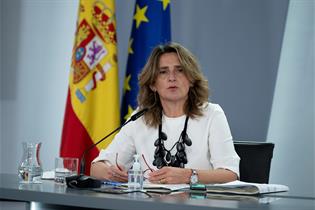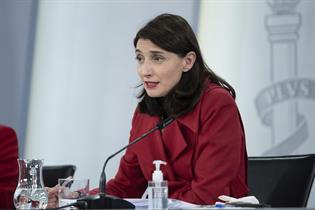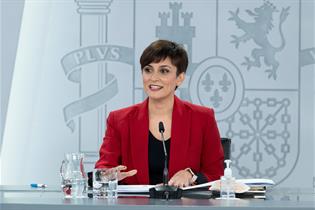Council of Ministers
The Government of Spain extends the measures to reduce electricity bills
Council of Ministers - 2021.12.21
Moncloa Palace, Madrid
The Council of Ministers has approved a Royal Decree-Law on energy measures, including the extension of the tax measures adopted during the last quarter of the year to alleviate electricity bills.
The Third Vice-President of the Government of Spain and Ministry of Ecological Transition and Demographic Challenge, Teresa Ribera, has described it as "fundamental" to maintain the suspension and reduction of certain taxes in light of the unflattering outlook for electricity prices on the wholesale market, which continue to rise.
Therefore, she explained, the 10% reduction of Value Added Tax (VAT) on electricity bills of consumers with contracted power up to 10 kW is extended until 30 April 2022, provided that the average monthly wholesale market price of the previous month is above €45€/MWh. Until the same date, beneficiaries of the electricity social voucher will maintain their discounts of between 60 and 70% of their consumption.
The Special Tax on Electricity (IEE) will remain at 0.5% until 30 April, the minimum authorised by European regulations, while the 7% tax on the Value of Electricity Production (IVPEE) will remain suspended until 31 March.
Furthermore, as an additional measure, the contractual conditions for the supply of gas to industrial installations that use this hydrocarbon, whose market price is also increasing, are being made more flexible. Until 31 March, companies that are forced to reduce their production may modify or suspend the contracted flow.
Super-reduced VAT for face masks
The Government has also extended the super-reduced VAT rate of 4% on disposable surgical masks until the first half of 2022, as well as the 0% VAT rate for domestic deliveries, imports and intra-EU acquisitions of medical equipment to combat COVID-19 purchased by health centres and social entities.
The Minister for Territorial Policy and Government Spokesperson, Isabel Rodríguez, has stated that the Executive has reinforced its commitment to Spanish families with this decision.
Installation of recharging points
 Foto: Pool Moncloa/Borja Puig de la BellacasaThe approved Royal Decree also promotes the roll out of the charging infrastructure for electric vehicles, renewable energy projects and self-consumption.
Foto: Pool Moncloa/Borja Puig de la BellacasaThe approved Royal Decree also promotes the roll out of the charging infrastructure for electric vehicles, renewable energy projects and self-consumption.
Teresa Ribera stated that, in order to meet the forecast of having 100,000 recharging points by 2023, it was considered necessary, on one hand, to simplify the installation regulations - for example, by exempting the prior need to obtain a building permit - and, on the other hand, to speed up the obligations for their implementation.
Thus, private non-residential buildings and car parks not attached to buildings will have to install recharging points when they have more than 20 parking spaces by 1 January 2023, in proportion to the number of spaces. In general, they shall have one recharging station for every 40 spaces or part thereof, up to 1,000 space - in the case of the General State Administration, there shall be 20 spaces up to 500 space - and one more station for every 100 space or part thereof.
Another incentive for the creation of recharging points will be the application of rebates by local councils, specifically of up to 50% of the full amount of the Real Estate Tax (IBI) and the amount corresponding to the Economic Activities Tax (IAE), and of up to 90% in the tax on construction, installation and work to install recharging points.
Renewable energy projects
For renewable energy projects, an additional period of nine months is set to complete the procedures for obtaining the Environmental Impact Statement and the corresponding administrative authorisations.
Teresa Ribera pointed out that this extension has been agreed at the unanimous request of the regional governments, whose management capacity has been overwhelmed by the high number of projects presented: "If the National Integrated Energy and Climate Plan estimates that by 2025 we need 35 gigawatts of additional renewable energy and by 2030 we need 60 gigawatts of additional renewable energy, we now have a pipeline of projects that amounts to 150 gigawatts."
On the other hand, project developers will be given the opportunity to waive projects they consider less viable or more complicated, with the consequent recovery of the guarantees they have deposited. This will free up the grid feed-in capacity associated with these projects for the next call for permits.
Promotion of self-consumption
Finally, measures are adopted to facilitate collective or shared self-consumption - in which several self-consumers benefit from a single installation - and this possibility is extended to high voltage, as until now it was only authorised at low voltage. Installations of less than 100 kilowatts that are willing to feed their surpluses into the grid are also exempted from submitting guarantees. In addition, distribution companies must have open communication channels - such as a free telephone number or e-mail address - to deal with queries and obtain information regarding grid access files for self-consumption installations.
Self-consumption roadmap
Teresa Ribera has stressed the importance of consolidating and accelerating self-consumption in Spain, where it has multiplied 2.5 times since 2018, when the so-called 'sun tax' was ended. To this end, the Council of Ministers approved the Roadmap for Self-consumption.
One of its goals is to reach 14,000 megawatts in self-consumption installations by 2030, exceeding the National Energy and Climate Plan's forecast of 9,000 megawatts by that date: "Currently there are already more than 3,000 megawatts installed, and given the interest we have detected in society, we could reach 14,000 megawatts, which would contribute to a very significant modernisation of our energy system and a democratisation in the type of actors involved in the production and consumption of energy".
The Roadmap includes 37 actions to raise awareness, promote collective self-consumption, dissemination and regulatory changes to improve the speed with which installations are processed. Ribera recalled some that have already been adopted, such as that homeowners' associations can apply for a self-consumption installation or access subsidies with the support of the majority of the neighbours instead of unanimously.
The document includes training and professional retraining, as self-consumption will be a relevant employment axis, especially in areas affected by the just transition, and takes into account the needs of isolated areas, island territories or neighbourhoods where "it can be an important solution or provide answers to energy poverty", said Ribera.
Boosting renewable thermal solutions
The Executive has agreed to grant aid to promote the implementation of renewable thermal energy installations in different sectors of the economy, such as industry, agriculture and services.
The vice-president added that it is also intended to promote the use of these clean energy sources - biomass, geothermal, solar thermal, etc. - in public sector establishments and infrastructures and in actions undertaken by companies in the form of energy services in the residential sector.
The initial budget of 150 million euros may be increased depending on demand and the development of projects. The funds will be allocated to the regional governments and cities, which will, in turn, have to make the corresponding calls for applications to grant the aid.
Digitisation of distribution networks
The Government will allocate 525 million euros from the Recovery Plan to digitise electricity distribution networks. The distribution will be 227 million euros in 2021, 148 million euros in 2022 and 150 million euros in 2023, she said.
The distribution companies will receive these funds in proportion to their representativeness. Potential beneficiaries will have to implement digital tools to improve customer service, including electronic offices to manage files related to access and connection of self-consumption installations and recharging points.
The digitisation of the distribution networks is included in the Strategic Project for the Recovery and Economic Transformation of Renewable Energies, Renewable Hydrogen and Storage (PERTE ERHA), which will channel more than 16.3 billion euros over the next few years to adapt the energy system and strengthen Spain's leading position in the field of clean energy.
Other measures relating to the energy sector
The aid programme for energy efficiency measures on agricultural holdings, which was initially due to expire at the end of this year, has been extended for a further two years, until 31 December 2023. It has 30 million euros to promote energy savings and the competitiveness of the sector, as well as measures to encourage renewable energies and the reduction of CO2 emissions.
On the other hand, the application of the Contingency Fund has been approved to finance 1.907 billion euros in payments derived from Supreme Court rulings against the application of the hydroelectric fee approved by the previous Government.
"The Supreme Court, at the request of the electricity companies, has considered this fee to be unlawful and we are obliged to reimburse what they have been charged over the years," Ribera said. Specifically, the Government must repay the amount collected in 2013 and 2014 and part of what was collected in 2015 and 2020, plus interest.
Draft Bankruptcy Law
 Foto: Pool Moncloa/Borja Puig de la BellacasaThe Council of Ministers has approved submitting the draft Law on the Reform of the Bankruptcy Law to Parliament, a law that places Spain at the forefront of corporate restructuring in Europe.
Foto: Pool Moncloa/Borja Puig de la BellacasaThe Council of Ministers has approved submitting the draft Law on the Reform of the Bankruptcy Law to Parliament, a law that places Spain at the forefront of corporate restructuring in Europe.
The Minister for Justice, Pilar Llop, stressed that the law transposes the European directive on restructuring and insolvency and joins two other structural reforms, also included in the Recovery, Transformation and Resilience Plan, which are currently in parliamentary procedure: the Crea y Crece Law and the so-called Startups Law.
Pilar Llop said that the aim of the regulation is to ensure that no viable company "has to close its doors" because of specific economic difficulties: "We don't want any entrepreneur to give up entrepreneurship because of a failed project that will weigh them down forever".
The directive focuses on three points: the early restructuring of viable companies, the possibility of debt relief for bona fide debtors and the need to increase the efficiency of insolvency restructuring and debt restructuring procedures.
The Minister for Justice pointed out that the new regulatory framework represents a qualitative leap with respect to the current bankruptcy model because it streamlines and makes procedures more flexible and incorporates the best practices of other European models.
The key, the minister reiterated, is the viability of economic activity: "It is not a question of maintaining the vital constants, of keeping any company going, at any cost, at any price, what is known as 'zombification' of companies, but of keeping companies going that are really viable, i.e. those whose going-concern value is higher than their liquidation value.
Pilar Llop added that this regulation will contribute to maintaining jobs and strengthening the productive business fabric in a context of recovery and transformation after the crisis resulting from the COVID-19 pandemic.
Restructuring plans
The minister said that reforms not covered by the EU directive but necessary to protect micro-companies have also been undertaken. In this sense, the text of the draft law introduces the figure of corporate restructuring plans, a pre-bankruptcy instrument aimed at avoiding insolvency or overcoming it, which encourages early action. Early warning indicators will alert companies to resort to pre-insolvency procedures before they reach financial problems.
Furthermore, Pilar Llop stressed that an online liquidation platform will simplify procedures, reduce costs and establish a specific procedure for micro-companies, which will allow them to restructure without having to go to a notary or an auditor.
Along the same lines, a new figure is regulated, the restructuring expert, who will mediate in the negotiations of restructuring plans and who will accompany debtors with little experience in those cases that go to court.
Second chance
On the other hand, it will make it easier for a bona fide debtor, whether entrepreneur or consumer, to write-off their debt. Llop explained that the deadlines for reaching final exemption are shortened. What is commonly known as the second chance is now called the discharge of unsatisfied liabilities benefit.
The debtor may opt for immediate discharge, through the liquidation system, or for a payment plan, a provisional discharge system.
The minister added that the efficiency and transparency of the procedure will be increased by improving the training, qualification and responsibility of insolvency administrators.
Renewal of the Public Employment Offer
 Foto: Pool Moncloa/Borja Puig de la BellacasaThe Government has approved a specific public employment call for the State Public Employment Service (SEPE) with 926 open access positions.
Foto: Pool Moncloa/Borja Puig de la BellacasaThe Government has approved a specific public employment call for the State Public Employment Service (SEPE) with 926 open access positions.
The spokesperson explained that this is an additional offer in addition to this year's ordinary offer and that it represents a very important reinforcement for the staff of this body.
Isabel Rodríguez has indicated that the SEPE services have provided coverage to the more than 3.4 million Spaniards who had to apply for this protection network that the Government made available to workers and the self-employed to sustain the economy at the worst time of the pandemic.
The minister specified that only 100,000 people are currently covered by this protection system.
Extension of missions abroad
The Council of Ministers has extended until 31 December 2022 the participation of military units and observers in peace operations outside the national territory.
According to its spokesperson, the Executive considers the actions of the Armed Forces in favour of security, stability and support for the most fragile and vulnerable societies to be more necessary than ever. Instability in the world has increased due to factors such as the effects of the COVID pandemic, the progressive and constant change of the climate or the resurgence of geopolitical tensions between great powers.
In addition, the presence of 3,000 Spanish military personnel in crisis and conflict zones contributes to highlight Spain's commitment to peace, under the aegis of the European Union, the United Nations and NATO.
Non official translation




